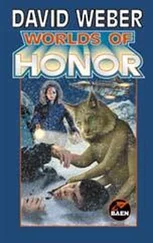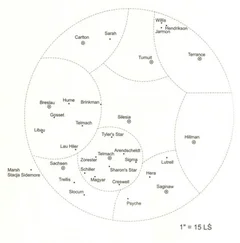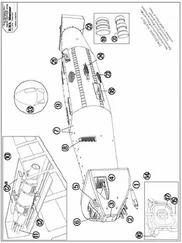David Weber - In Enemy Hands
Здесь есть возможность читать онлайн «David Weber - In Enemy Hands» весь текст электронной книги совершенно бесплатно (целиком полную версию без сокращений). В некоторых случаях можно слушать аудио, скачать через торрент в формате fb2 и присутствует краткое содержание. ISBN: , Издательство: Baen Publishing Enterprises, Жанр: Фантастика и фэнтези, на английском языке. Описание произведения, (предисловие) а так же отзывы посетителей доступны на портале библиотеки ЛибКат.
- Название:In Enemy Hands
- Автор:
- Издательство:Baen Publishing Enterprises
- Жанр:
- Год:неизвестен
- ISBN:0-671-57770-0
- Рейтинг книги:3 / 5. Голосов: 1
-
Избранное:Добавить в избранное
- Отзывы:
-
Ваша оценка:
- 60
- 1
- 2
- 3
- 4
- 5
In Enemy Hands: краткое содержание, описание и аннотация
Предлагаем к чтению аннотацию, описание, краткое содержание или предисловие (зависит от того, что написал сам автор книги «In Enemy Hands»). Если вы не нашли необходимую информацию о книге — напишите в комментариях, мы постараемся отыскать её.
In Enemy Hands — читать онлайн бесплатно полную книгу (весь текст) целиком
Ниже представлен текст книги, разбитый по страницам. Система сохранения места последней прочитанной страницы, позволяет с удобством читать онлайн бесплатно книгу «In Enemy Hands», без необходимости каждый раз заново искать на чём Вы остановились. Поставьте закладку, и сможете в любой момент перейти на страницу, на которой закончили чтение.
Интервал:
Закладка:
Nor was Alistair the only person whose emotions lashed at her, for Andrew LaFollet followed close behind her. His utterly emotionless expression might conceal it from everyone else, but Honor felt every nuance of his frantic sense of helplessness... and failure. Echoes of those same emotions snarled in the back of her brain from James Candless and Robert Whitman, as well, for they were Grayson armsmen who could no longer protect the woman they were sworn to guard, and their desperate concern for her threatened to be more than she could bear.
She wanted to scream at them, to command them to stop. To beg them to protect her from their emotions, at least, since they could no longer protect her from anything else. But even if there'd been any hope that they could obey such an order, she had no right to give it, for the feelings whose echoes gouged away bits and pieces of her soul sprang from who and what her armsmen were. It was their devotion to her which made them so frantic, and how could she add to their distress by telling them how their misery tormented her?
She couldn't, of course. In fact, she'd done all she could by identifying them to their captors as Grayson Marines. She'd recognized McKeon's astonishment when she informed Luchner that LaFollet was a Marine colonel and that Candless and Whitman were both Marine lieutenants, but he'd said nothing. She knew he'd assumed she was lying in order to keep Candless and Whitman from being separated from her when the prisoners were segregated into commissioned and enlisted ranks, but he was only half right. That was the reason she'd identified them as Marines, but she hadn't lied.
The Grayson word "armsman" was a term with a multiplicity of uses. It was used for most police personnel, but it had a very special meaning where a steadholder's retainers were concerned. The "Harrington Steadholder's Guard" was actually two separate bodies, one within the other. The smaller of the two—properly known as the Steadholder's Own Guard—consisted of only fifty men, because the Grayson Constitution limited any steadholder to a maximum of fifty personal armsmen. The Harrington Steadholder's Guard as a whole contained the Steadholder's Own, who held commissions in both, plus every other uniformed member of Harrington Steading's police force. All of its members—to the confusion of foreigners—were called "armsmen," but there were significant differences between their duties. The Steadholder's Own provided Honor's personal security detachment—a function in which the rest of the Guard assisted as required—and replacements for the Steadholder's Own were normally drawn from the rest of the Guard, as well. But she could never have more than fifty personal armsmen, for Benjamin the Great hadn't spent fourteen years fighting one of the most bitter civil wars in human history just so his son or grandson could do it all over again. The steadholders' armies of personal retainers had provided the core of trained troops for both sides in the civil war, and so Benjamin's Constitution had set an absolute ceiling on the personal legions his steadholders could thenceforth raise. And he'd taken one more precautionary step by granting every armsman an officer's commission in the Grayson Army, as well.
His intent had been simple. If all armsmen belonged to the Army, then—in theory at least—a Protector could summon the armsmen of a recalcitrant steadholder to active Army service, thus depriving him even of the fifty personal retainers he was allowed. The fact that a steadholder who was allowed only fifty armsmen would tend to recruit the very best he could find also meant that the supply of backup officers they represented would be of high caliber if they were ever actually needed, which was an additional benefit, but everyone knew it had also been a secondary one from Benjamin's viewpoint.
Unfortunately for his plan, however, the Planetary High Court of a later (and weaker) Protector had observed that armsmen received their Army commissions because they were armsmen... and that they became armsmen in the first place on the basis of the oaths of loyalty they'd sworn to their steadholders. In the court's view, that meant their first responsibility was to the steadholders they served, not the Army. As such, they could be called to active Army service only with the consent of their liege lords, which no steadholder engaged in a face-off against the Protector was likely to grant.
That had blown Benjamin's intentions out from under his descendants, but the constitutional provisions remained. And since Grayson Marines were simply Army troops assigned to shipboard duty, and since LaFollet, Candless, and Whitman did hold Army commissions, they were indeed technically Marine officers. It was a fragile assertion, resting entirely on the peculiarities of Grayson's domestic laws, but it was an honest one, and the fact that the personnel records for Honor's armsmen had all been left in her personal files aboard Alvarez meant there was no documentary evidence to challenge it.
Yet any satisfaction Honor had felt when Luchner accepted them as Marines had been no more than a brief flicker in the blackness which had engulfed her, dwarfed by the defeat and failure which filled the men and women about her. In many cases it was accompanied by an enormous sense of gratitude at having survived, as well, but for most even that relief was flawed. In a way, having been spared death or injury became another source of shame, for the survivors felt guilty for being grateful, as if that very human reaction were somehow despicable, and that, too, beat in upon Honor through Nimitz.
She closed her eyes, tasting the bitter flavor of her officers' inner darkness, and hugged the 'cat to her chest. Like most of the captured officers following her towards Katana 's boat bay, he still wore his skinsuit. It made him much too heavy to ride in his usual place on her shoulder, but she had deliberately chosen to leave him in it, and her arms tightened about him as she faced the reason she had.
A dark and terrible—and intensely personal—fear snarled deep inside her. She'd done her best to drive it out of her forebrain, to ignore it or at least to so occupy herself with her duties that she could pretend she'd ignored it, but all her efforts had been a lie. The fear only laughed at efforts to suppress it. It jeered and whispered to her, mocking her, and her inability to set it aside as her intellect insisted she ought only made her ashamed of the weakness she could not master.
But worst of all, the same intellect which told her it was her duty to defeat her fear knew that fear was valid, for it was the fear of separation. The fear that her captors would dismiss Nimitz as no more than a curious, alien pet—an animal—and separate her from him. Or, still worse, that they would class him as a dangerous alien animal. The consequences of any such decision terrified her so deeply that she dared not let herself face them fully, yet neither dared she ignore them. And so she'd left him in his suit, hoping his obvious training in its use would emphasize his intelligence and make it clear he was far more than a "mere animal" when the time came for her to defend him as such. And, she admitted, the suit's gloves hid the murderous, centimeter-long scimitars of his claws. None of her captors had ever seen Nimitz in action, and if she could just conceal the lethality of his natural weapons until she'd had a chance to fix his intelligence and self-control firmly in their minds, perhaps she could protect him.
Perhaps... and perhaps not. But if she couldn't, if someone tried to separate them or to injure Nimitz, if—
She clenched her jaw and jerked free of the choking panic as it tried to build within her once more. She had other responsibilities, duties she must somehow discharge, and she felt Nimitz reach up to stroke her face with a gentle true-hand. He felt her dread, and she knew he understood its source, for she felt his answering fear. In fact, the two of them were trapped in a feedback loop in which their shared fear fed upon itself and grew strong. But she also felt his support, his love and fierce rejection of her conscience's efforts to punish her for the way her thoughts seemed to waver and flow like water when she should be concentrating on her duty to the people her orders had brought to this.
Читать дальшеИнтервал:
Закладка:
Похожие книги на «In Enemy Hands»
Представляем Вашему вниманию похожие книги на «In Enemy Hands» списком для выбора. Мы отобрали схожую по названию и смыслу литературу в надежде предоставить читателям больше вариантов отыскать новые, интересные, ещё непрочитанные произведения.
Обсуждение, отзывы о книге «In Enemy Hands» и просто собственные мнения читателей. Оставьте ваши комментарии, напишите, что Вы думаете о произведении, его смысле или главных героях. Укажите что конкретно понравилось, а что нет, и почему Вы так считаете.












